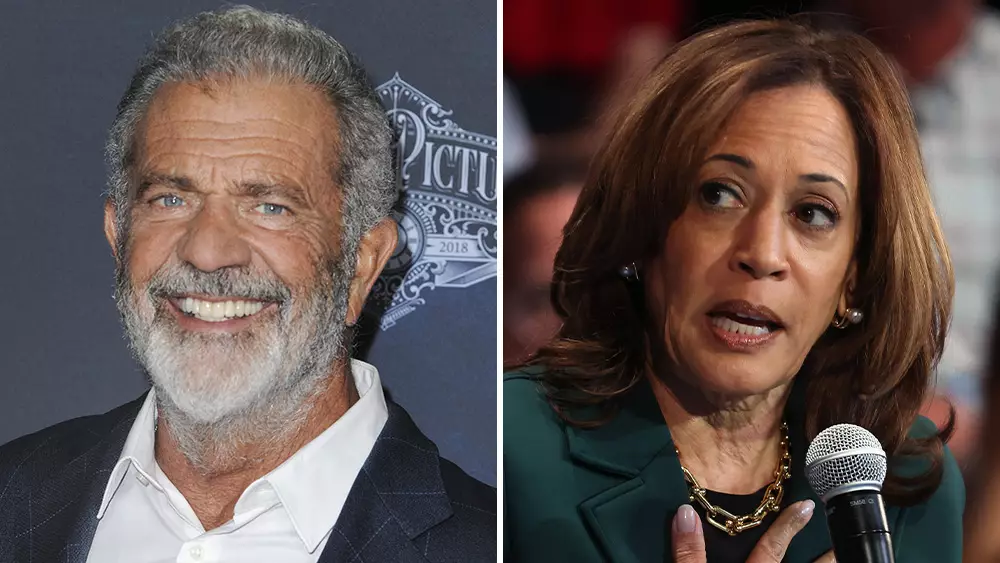In recent days, Andrew Garfield’s commendation of his “Hacksaw Ridge” director, Mel Gibson, for his purported journey of personal healing has sparked debate—especially in light of Gibson’s recent comments about Vice President Kamala Harris. Caught on camera by TMZ, Gibson’s disparaging remarks regarding Harris’ intelligence were laced with political fervor, as he emphasized his support for Donald Trump’s return to the White House. As a public figure, Gibson’s statements raise significant questions about the reconciliation of his controversial past and his ongoing participation in Hollywood, a community often characterized by its progressive ideologies.
Mel Gibson is no stranger to controversy. His history is punctuated by various instances of offensive behavior, including public rants that disparaged entire groups of people. The most notorious incident occurred in 2006 when Gibson, during a DUI arrest, made antisemitic remarks that resulted in widespread condemnation. This moment marked a watershed point in his career, leading to a distancing by many in the film industry. Although he has issued multiple apologies, the specter of these past indiscretions looms large, casting doubt on the authenticity of his claims of personal growth.
In 2020, the actress Winona Ryder recounted a troubling interaction with Gibson, alleging that he made an offensive remark about her Jewish heritage at a Hollywood party. Such stories continue to surface, complicating the narrative of redemption that Gibson attempts to construct. This raises the question: Can a figure with such a history of prejudice genuinely experience healing, or does their legacy overshadow any progress made?
The Implications of Gibson’s Comments About Vice President Harris
Gibson’s recent comments calling Kamala Harris “the IQ of a fence post” resonate with a certain strain of political discourse that aims to demean rather than engage. When such dismissive strategies are employed, they do not merely reflect on the individual making the remarks; they also illuminate a broader cultural attitude towards women in power. Notably, former President Donald Trump has similarly disparaged Harris, likening her responses to those from a “loony bin.” This politicization of personal attacks against public figures, notably women, presents a troubling trend in contemporary political dialogue.
The choice of language used by Gibson and Trump echoes a long-standing trope of demeaning female intelligence. By resorting to such insults, they not only undermine their credibility but also contribute to a hostile environment for women in leadership. The implications of such rhetoric extend beyond the individuals targeted; it cultivates a culture where women’s capabilities are continuously questioned and belittled, hampering their legitimate pursuit of political and social influence.
Andrew Garfield’s previous admiration for Gibson attempts to navigate the murky waters of celebrity redemption. In an industry that frequently grapples with issues surrounding accountability and forgiveness, the overlap between respecting artistic talent and condoning troublesome behavior presents a precarious balancing act. While it is essential to recognize Gibson’s contributions to the arts, Garfield’s praise juxtaposed against Gibson’s recent rhetoric raises questions about the actor’s critical discernment.
As members of the public audience, it is crucial to interrogate such endorsements and hold celebrities accountable for their associations. Celebrating artistic achievements while ignoring troubling behavior creates a dissonance that undermines the impact of those achievements. This tension reflects a broader societal issue: how do we celebrate the complex legacies of flawed individuals without enabling harmful attitudes that persist within public discussions?
The recent events surrounding Mel Gibson and Andrew Garfield serve as a focal point for discussions about celebrity behavior, accountability, and the pervasive toxicity in political discourse. As culture continues to evolve, the way we regard individuals with troublesome histories warrants careful consideration. Recognizing the value of artistic contributions is essential, but it should not provide a shield against accountability.
Thus, the challenge remains: how can communities move forward in promoting inclusivity and respect in political dialogue while appreciating the nuances of human imperfection? The discourse surrounding figures like Gibson and Garfield offers a rich landscape for examination—one that insists on holding individuals responsible for their words and actions while still striving for a culture that encourages dialogue over derision and understanding over hostility.



Leave a Reply